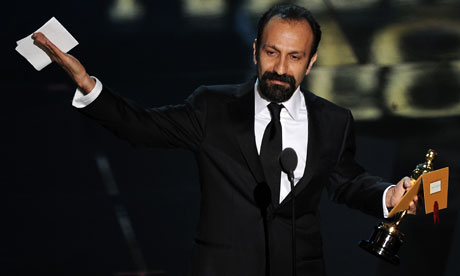
A Separation has become the first movie ever to take an Academy Award to Iran after winning the best foreign language Oscar, prompting national celebration at a critical time in the country's history.
Millions of Iranians stayed up all night to watch the film's director, Asghar Farhadi, going up on the stage and delight his countrymen at a time when their lives are clouded with fear of war with Israel and crippling economic sanctions.
"At this time, many Iranians all over the world are watching us and I imagine them to be very happy," said Farhadi, while accepting the Oscar. "At the time when talk of war, intimidation, and aggression is exchanged between politicians, the name of their country, Iran, is spoken here through her glorious culture, a rich and ancient culture that has been hidden under the heavy dust of politics."
He added: ""I proudly offer this award to the people of my country, the people who respect all cultures and civilisations and despise hostility and resentment."
With his acceptance speeches at various international awards, including a Golden Globe in January, Farhadi has become an ambassador for peace from Iran, making Tehran's regime - famous for its bellicose statements - infuriated with the film's success in countries hostile towards the Islamic republic.
Iran's A Separation was up against Belgium's Bullhead, Israel's Footnote, Poland's In Darkness and Canada's Monsieur Lazhar.
Within few minutes of winning an Academy Award, Iranians took to the social networking websites such as Twitter and Facebook, congratulating themselves on A Separation's success at the Oscars.
"Imagine Iranians are now waking up to find the world is talking about its cinema, not its nuke, for a change," said Iranian journalist, Reza Asadi, on his Twitter account.
The Oscars was not broadcast live in Iran by the state media, but many Iranians watched it through illegal satellite dishes. Many online users shared Farhadi's comments and clips of his acceptance speech and news websites based outside the country liveblogged the event.
Despite generating patriotic sentiments among ordinary Iranians, Tehran leaders have been skeptical about the film's worldwide success, especially in the United States which they consider as a sworn enemy.
A Separation was originally produced with permission from the Iranian government. But in the face of its success, the regime has not publicly denounced the film but many of its supporters have publicly spoken against it. In a programme broadcast in the state-run television, Masoud Ferasati, an Iranian writer whose views are close to those of the Islamic regime, said: "The image of our society that A Separation depicts is the dirty picture Westerners are wishing for."
He added: "On one hand, they [the US] impose sanctions against us and on the other, they give award to our film, to send us a positive signal, I think this [the film's success] is an illusion. This is not a good film." Ferasati's remarks have been echoed by many other regime supporters.
A Separation, Farhadi's fifth feature film, follows the story of two Iranian families whose lives have become twined to each other. Simin (Leila Hatami) is seeking to leave her husband, Nader (Peyman Moaadi) as she wants to leave Iran for a better life; he wants to remain and care for his ill father. When Simin goes back to her parents, Nader hires a maid, Razieh (Sareh Bayat) to take care of the housework – which results in a cross-class clash after an incident that takes both families to a Sharia court.
A Separation had managed to obtain government blessing although permission for its production was briefly removed in 2010 when Farhadi voiced support for imprisoned film-maker Jafar Panahi at the Iran Cinema Celebration festival. After its nationwide release, it attracted an unprecedented audience for an independent film inside the country and even won government-sponsored awards.
A Separation's popularity in Iran left no choice for the regime but to put its name forward for the Oscars.

